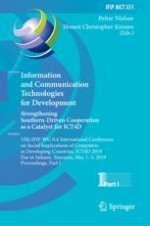2019 | OriginalPaper | Chapter
How South African University Information Systems Students Are Using Social Media
Authors : Yazeed Seedat, Sumarie Roodt, Samwel Dick Mwapwele
Published in: Information and Communication Technologies for Development. Strengthening Southern-Driven Cooperation as a Catalyst for ICT4D
Publisher: Springer International Publishing
Activate our intelligent search to find suitable subject content or patents.
Select sections of text to find matching patents with Artificial Intelligence. powered by
Select sections of text to find additional relevant content using AI-assisted search. powered by
